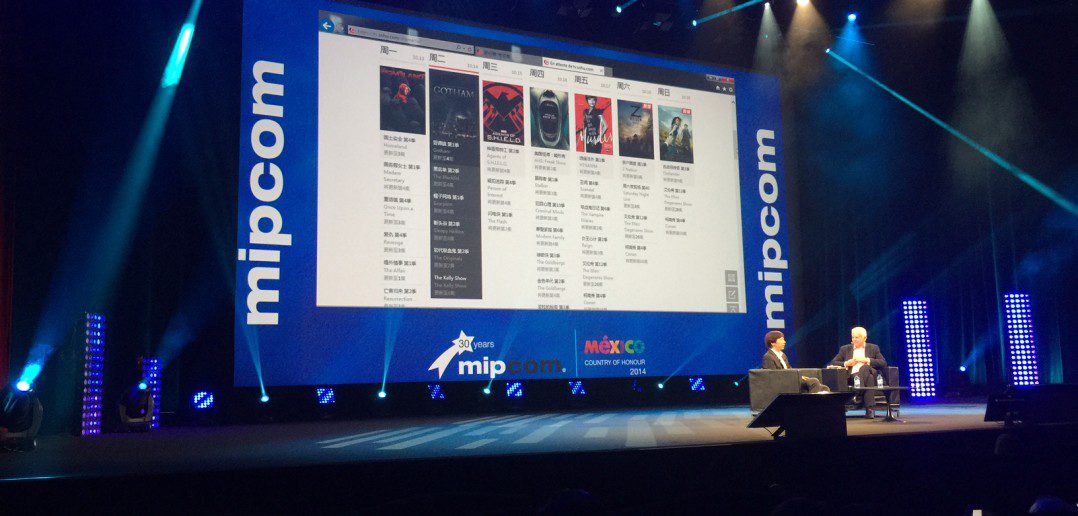China is a fascinating market for media and entertainment, but one of the toughest for Western firms to operate in successfully. So what’s happening there around media, entertainment and digital disruption? One man who should know is Charles Zhang, founder, chairman of the board and CEO of internet giant Sohu.com, which he launched 18 years ago. Today, he was interviewed at MIPCOM by Marcel Fenez, global leader, entertainment and media at PwC, to pick his brains on digital China and its potential.
He started by talking about online video in China. « We serve about three billion video views a day. What we are experiencing really is a revolution in the last five years. Basically the bandwidth was ready for video, and then we waged two wars on piracy… the first is in 2009 and the second is in 2013, and they basically laid the legal framework for a legal business. »
He talked about the government’s crackdown on piracy in 2009, which laid a foundation for basic PC, browser-based video viewing, with domestic TV shows first to feel the benefit, then overseas shows that were bought in by Chinese companies. Zhang then talked about the second anti-piracy coalition in 2013, with a major public awareness campaign as well as government action. « Basically now we have wiped out the more controversial, sophisticated way of piracy, » he said. « Miraculously, the piracy issue in China that has been for so many years a problem, is solved. And now we have blue sky… I wouldn’t say we are 100% clear, but probably 95%. »
Zhang talked about the state of the legal online video market, noting that the traditional state-owned television channels aren’t very competitive, and there is no cable TV industry in China or pay-TV model. This opened the way for Sohu.com and other firms to innovate. « We had a lot of things to do to basically replace TV stations, to provide the basic viewing of TV dramas and all kinds of programmes. So that’s what we did. »
Now, Sohu.com’s content is 80% domestic and 20% international, with the former starting with TV dramas. « There was a movement about eight or ten years ago for separation of the production and the broadcast in TV stations. There are more and more studios, related to the TV stations, became standalone. And there were new studios… So now you have many many contents produced by this market-driven content. So you see the quality. »
Zhang talked about younger people, who are watching shows on websites rather than on television. He noted that in 2014, a few TV shows have become so popular in China, but are never shown on television. « Content made for internet is enough, it can become a phenomenon, » he said, noting that a number of companies have started making shows for online viewing only.
Zhang also talked about regulations, suggesting that internet sites currently suffer from less regulation in China than traditional TV channels. « This internet sector is just more progressive compared to the television department. » And Zhang also noted that producing content is cheaper for Sohu.com than buying it in. But he said that internet companies don’t necessarily have the creative DNA required to produce all their own content, responding to a question about rival Alibaba’s investment in production. « I don’t think they are really a serious competitor to the existing video companies. » Would Sohu go out and buy a major studio to bring more production in-house though? He suggested not, preferring to have the choice of a wide selection of production partners.
Will Chinese consumers ever pay for anything? « I will tell you now, Chinese people do pay, if you provide them with really valuable [content], » he said. « In the past five years, because of the micropayment problem, because there is no credit card use, and all these banks are real-estate owned and not very customer-friendly and all of these things, it’s become difficult for Chinese people to pay. It’s not that they don’t want to pay… Now that problem is resolved. » By which he meant there are new payment technologies available to change that. « Payment is not the issue… You pay a monthly subscription or pay one or two dollars. No problem! »
He did say that in an advertising-funded model, TV shows work better than films, since the latter only have room for a minute or so of ads, whereas TV shows suit many more. But with payment solutions in place, films are next on Sohu.com’s agenda. « Next, we are going to buy Hollywood movies. People will pay. And we will see other types of business models start to arrive and explode. »
At some point, might the state-owned sector step in and suggest that it needs a bigger share of the digital video market, through regulation? « No, I don’t see that, » said Zhang, noting that a number of brands are moving more of their ad budgets online and away from TV. « Actually, the government is happy to see that… they are happy to see the internet really developing… It’s just that on the traditional TV, the big screen… the government see this big screen as a place where you reach to the 1.3bn people. So the content there has to be really politically correct. But they see the internet as somewhere where ‘these guys are educated’, so its’ free. »
What would Zhang do now if he was working in television? « I would leave and start a content company, » he said, drawing a laugh from the crowd. « You’ll be on the right side of history!.. The future is really bright, and the Chinese younger generation really enjoys quality international content… so we are waiting for you guys to come to China to give us the good content. »




